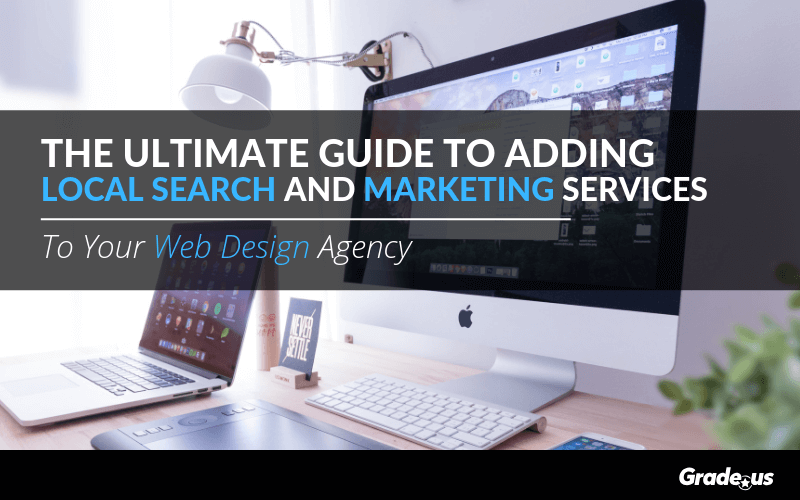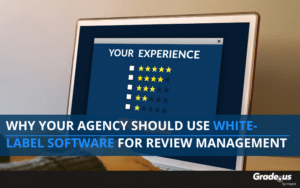Your web design agency (especially if you have local small business clients) has an opportunity to expand your business by offering XYZ services.
Typically, if this is you, your agency is highly technical and incredibly talented.
But you're also a specialist.
Maybe you don't have local search marketing experience.
Isn't it unethical then, to offer local search and marketing services if your agency isn't already skilled in this area?
Not at all.
Your average web design agency struggles with these questions
They're not sure how to handle the answer so many firms simply choose to avoid the question entirely. But this is a serious mistake. It certainly sounds like I'm exaggerating, as if I'm blowing this completely out of proportion.
This isn't hyperbole.
It's a necessary and important part of serving your clients. If you're running a web design agency you should be prepared to offer these services to your clients.
But why?
Why go out of your way to offer local search and marketing services?
Protection.
Your clients need protection from a variety of sources. If they hire you for a development project, even for a small project, they need your protection from:
1. An industry that's in a constant state of flux. There's a consistent stream of new methodologies and frameworks agencies are expected to manage. It's an incredibly difficult balancing act agencies deal with on a daily basis. Clients expect agencies to integrate incompatible platforms, poorly documented frameworks and legacy code bases. They're expected to blend them together seamlessly, something clients are unable to do themselves.
2. Incompetent service providers. It's common for agencies to turn the project over to clients at the end of the engagement. This is where the trouble begins. A clueless, unfamiliar and incompetent marketing provider steps in. Very quickly, they damage, break or undo your incredible work. They modify things to the point where your client's work fails to perform as promised. Of course, these incompetent service providers tell your clients it's all your fault. Your client believes them because they don't know any better.
3. Poorly conceived campaigns. Service providers who are unfamiliar with your work create poorly conceived campaigns. Website visitors are sent to irrelevant pages, incomplete pages with missing assets or 404 errors due to broken links. This wastes significant amounts of your client's time, energy and resources. This is also your fault. What else should they believe? Your agency isn't there to tell them otherwise.
4. Your agency's good intentions. It's an inevitable part of development. You produce incredible work for your client. Your client is overjoyed at the progress you've made. But then, shortly after launch, when you're no longer part of the project, you see the mistakes you've made. You realize there were better ways to solve the problems than the solutions you selected. You're no longer attached to the project and you're not really in a position to make things right, not without severe penalties anyway. You do what most agencies do and you move on, hoping no one notices your mistakes. If only you knew how to build sites that were review and local search compliant.
This isn't everything but it makes my point.
However, these are some of the most compelling problems your clients face with specialist firms. Other firms won't understand what you've done and you won't understand your clients needs enough to produce a compliant website.
It's an uncomfortable feeling.
It's also a compelling reason to add local search and marketing to your list of services.
Level up your web design agency's skill set
Your web design agency can't add these offerings to your list of services if there's a lack of training.
If you're like most specialist web design agencies, you don't have the know-how, team or resources to immediately offer these services to clients in a viable way. As a design specialist, your focus may have been strictly on the creative and development side of the business.
There's also the planning.
Agencies need to think about and plan for a specific list of details before they're able to add these services in a credible way. Here's a short list of the details you'll need to prepare for.
Offering marketing services
Education
You'll need to be able to discuss these local search and marketing services intelligently with your clients, providers, contractors/freelancers and vendors. You'll need local search education and training to be able to offer this service at a high/profitable level. This is a must whether you're interested in doing the work yourself, outsourcing or referring the work to a trusted third-party.
Pricing
You'll need to determine the pricing model that works best for your agency. Should you bill hourly? What about fixed-fee, retainer or subscription arrangements? Which one will produce the greatest value for your agency and your clients? If you're unsure about this download our pricing guide for clear answers on this topic.
Process and protocols
You'll need to have a list of the systems and procedures you'll need to manage the work appropriately. This work enables you to train new employees, hire contractors safely and work with vendors competently (on behalf of your clients)
A list of timelines
You need to know how long each task, step and phase should take. Precise numbers are ideal but difficult to come by (even for experienced providers) however you should have a good estimate. This enables you to attract the right clients, bill for your work accurately and establish a strong position in the marketplace.
A list of deliverables
Finally, you'll need to know which deliverables should be offered and when, the formats and restrictions (e.g. PNG vs. JPEG, desktop vs. mobile resolution). Will you provide source/raw files? Do clients have the right to create derivative works? There are a variety of deliverable details that need to be addressed ahead of time.
Service fulfillment
Fulfillment
How will you actually get the work done? If you're running a small agency, will you learn to do the work yourself, hire employees or outsource the work to a trusted third-party? If you choose to refer clients to a trusted third-party will you be compensated? If so, how much?
Employees
You'll need to have a system like Topgrading that enables you to attract A Player talent. If your agency is already established you'll need to determine the compensation package you're offering (e.g. salary + benefits + incentives + culture).
Outsourcing
Will you white label this relationship or will it be displayed transparently to clients? Will you use offshore, nearshore or freelance providers? How much of the local search and marketing work (from clients) will you outsource to third-party providers? 20 percent? 50 percent? 100 percent?
You'll need to make a distinction. How many providers will you rely on? Can they handle a sudden increase in workload reliably with no loss of quality? If quality is a concern, you can use sites like TopTal to source top-tier marketing talent. If you're a larger firm and you're looking to work with established agencies on a contractor basis Clutch.co is a great place to start.
Referrals
If you don't want to handle the workload internally (via employees) or externally (via freelancers/outsourcing), you'll still need a solution. Many of your clients will expect you to provide them with a solution to their local search and marketing challenges.
How deep will your referral go? Will you provide your clients with an introduction to a point person at your company of choice? Will you still be the point of contact for the project or will your referral partner take over? Are you willing to accept referrals from a competitor? You'll need to decide ahead of time.
Management
You'll need to create a list of rules and protocols, systems and procedures you can use to manage employees, freelancers, offshore and/or nearshore providers. All of the details we discussed in the section need to be written down. These need to be recorded in some fashion so you can train someone else to do what you do with no loss of quality.
Quality assurance
Which internal and external metrics will be used vet fulfillment partners? How will you verify that the local search and marketing campaigns you manage meet quality standards? How will you determine success? You'll need to create a list of metrics and KPIs to verify performance.
Maintenance
You'll need to outline the tasks that need to be completed/performed on a weekly, monthly, quarterly and annual basis. Your processes and protocols should provide you with the tools and resources you need to provide clients with comprehensive local search and marketing services.
It's a lot to take in.
These are the various areas that need to be considered when adding local search and marketing to your service mix. Your clients want to see that you have a handle on these details ahead of time. These issues will frequently crop up as clients look for ways to test and validate your knowledge.
Their expectations are simple.
They expect you to know far more about local search and marketing than they do. This means at a minimum, you'll need to spend a significant amount of time studying, learning and educating yourself on the ins and outs of local search and marketing.
This includes important subcategories like social media, online review marketing and management. Here's the next most obvious question.
How does a web design agency add these services successfully?
Your local search services need the right ingredients
To be effective, clients need a layered local search strategy. Your clients will need results in the short and long-term. This will require a mix of eight distinct ingredients.
1. Local search is primarily focused on optimizing client websites/profiles for search queries with local intent. As you know, local search is oriented around local businesses. Plumbers, florists, attorneys, restaurants, hotels, etc. Businesses that depend/rely on (a.) local customer traffic for their survival and (b.) direct response outreach that produces actionable results (e.g. sign-ups, purchases, orders and phone calls). These clients need results yesterday. Google uses these local search signals to rank pages/profiles.
2. Organic search: You know this one. Google focuses on optimizing client websites/profiles for search queries with no local intent. Google relies on a variety of signals to categorize and classify results. If you're running a web design agency, you need to know how to optimize content, images, video, audio, reviews, slides and a variety of other formats in the search results. You know the drill, on-page optimization, off-page optimization, link building, social signals, reviews, etc.
3. Google My Business optimization: You'll need to help clients create, claim and verify their listings. You'll also need to ensure their citations/NAP (name, address and phone) data is accurate and up-to-date. You'll also want to speak to your client's customers directly via GMB messages, add posts and share relevant business updates. Next, you'll need to help them track performance via GMB Insights. This isn't a one and done to-do, it's something that requires consistent effort to manage and maintain. This means they'll need your help.
4. Review management: Review management has a tangible and measurable effect on conversion rates. Research shows a strong review portfolio can increase your conversion rate by 270 percent. You'll need to know how to create, manage and maintain a review management campaign. You'll also need to know how to improve your client's review portfolio and prove the ROI of any review management campaigns you manage. This encompasses reputation and crisis management. You'll also need review management software to track, manage and maintain your review management campaigns.
5. Content creation and optimization: A recent survey found that content marketing was the third most effective customer acquisition channel, preceded by word-of-mouth and organic search. Education is a powerful attraction mechanism that drives customers to your site. When combined with advertising, education provides you with the tools you need to help clients build a strong relationship with their customers.
6. Social media management: Google confirmed that social media is a strong ranking signal then denied it. It's still important. Why? Because it's difficult to fake and easy to measure. Research shows there's a strong correlation between social signals and ranking position. You want to make sure that you have social media management tools in place to manage, monitor and grow your social media following.
7. Paid search: You'll need a viable solution for clients with hyperlocal businesses. Local search functions like a chef's knife while paid search operates much like a scalpel. Paid search enables you to provide a steady supply of conversions for clients with specific needs (e.g. those confined by certifications/licenses or ties to a particular region, area or zip code). Results can be difficult to achieve, even with a significant amount of search traffic. Paid search provides you with the detail and surgical precision you need to generate on-demand results for your clients.
8. Local search funnels: Local business owners are typically overwhelmed. In the beginning, they're running from one fire to the next as they do everything they can to keep their business afloat. If you've done an amazing job for your clients they're inundated with leads. Leads they don't have the time to follow up with. Do an amazing job and clients may not have the ability to follow up with customers you've sent to them. Worst case scenario, this leads to bad reviews and a significant loss of revenue. You'll need to create local search funnels for clients who are overwhelmed and unsure about how to follow up.
9. Phone call optimization: 69 percent of mobile customers prefer to call local businesses. 94 percent of customers view phone numbers as a trust booster. They want to see a telephone number listed on your client's landing pages and they want someone to answer when they call. You'll need to know how to optimize your client's website and landing pages for click-to-call campaigns.
10. Local search tools and widgets: You need to have a firm grasp of the widgets and tools your clients need for their local search campaigns. These include located widgets, book online widgets, review scan widgets, trust seals, review stream, promos and Twitter timelines. As a design/development agency, you should already have the knowledge and skills you need to work with these widgets.
11. Retargeting + remarketing: It takes time to find the right local customer. You'll need to become familiar with remarketing and retargeting campaigns. These marketing campaigns give you the chance to share an irresistible offer with your client's customers. With the right offer and a strong value proposition, you should have what you need to attract and convert a significant portion of your client's web traffic.
Here's a brief example of how this could work for your agency.
Say clients have hired you for a major redesign project. You've completed the project. They're excited but nervous about their project. How will their website perform they wonder? You provide them with an irresistible offer.
You'll increase their on-site conversion rates by 30 percent, within 30 days. If you succeed, they sign a six-month agreement for you to boost their conversion rates further.
The initial 30-day effort is free, think of it as a free trial.
During this time you:
- Claim, create and optimize all GMB, review and social media profiles.
- You create a review funnel reaching out to existing/pilot customers for reviews
- Embed these reviews on your landing/conversion pages
- You spend $20 to $100 dollars (via free credit) to identify top performing keywords with local search intent
- You optimize their site around these high performing keywords
- You create first (blog posts) and third party (guest posts) content around these keywords
- Lead magnets draw readers to your client’s offer
- You create an irresistible offer for your clients to dramatically boost conversions
Most of these steps can be completed in less than a week. Repeat this process to attract more clients.
You'll need to have a specific set of education, training tools and mentors to help you scale your agency. You'll need to have a team of helpers (employees, freelancers, contractors or referral partners) to help you manage their workload.
Start now.
This enables you to start small and move quickly.
With the right ingredients and a clear structure to follow, you'll have what you need to build a strong network of helpers. This gives you the chance to (eventually) create an employee-run agency.
Your web design agency doesn't have to struggle with these questions
Your clients need your protection.
They need protection against an industry that's in a constant state of flux. Protection from the incompetent. From poorly conceived campaigns. From good intentions.
Inexperienced clients don't know how to ask.
They don't know what to ask.
They need you to guide them. Your clients need you to help them with the unexpected twists and turns that come with their project. These are the inherent problems clients face with specialist firms.
This isn't an exaggeration.
As we've seen, these challenges are a necessary, important and inevitable part of serving your clients. If you're running a web design agency clients need you to be prepared. It's a compelling reason to add local search and marketing to your list of services.
You can do it.
With the right education and a bit of training, you'll have the tools and resources you need to expand your web design agency’s local search offering.
About the Author
Andrew McDermott
Andrew McDermott is the co-founder of HooktoWin. He shows entrepreneurs how to attract and win new customers.









